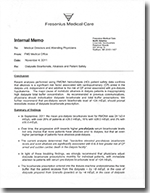This is a Heart Attack – on the Fresenius GranuFlo Lawsuit and Your Health

This is cardiopulmonary arrest. The heart stops contracting effectively, making blood circulation cease, making the brain unable to receive oxygen, leading, very quickly, to the possibility of permanent brain damage or death. Within seconds, a person loses consciousnesses and has no pulse. If the patient does not receive treatment, death can occur within minutes. Also known as sudden cardiac arrest, sudden cardiopulmonary arrest occurs quickly and without warming.
This is a heart attack. Blood flow to the heart stops, causing the heart to become damaged and unable to beat. While symptoms of a heart attack may be intense or even immediate, more often heart attack symptoms start slowly and persist for hours, days, even weeks, before a heart attack.
While commonly confused, cardiopulmonary – or cardiac – arrest and heart attacks are not the same; unlike with sudden cardiac arrest, the heart typically does not stop beating during a heart attack. However, both cardiopulmonary arrest and heart attacks are possible to occur following the use of GranuFlo for one’s dialysis treatment.
Not just the loss of a pulse or consciousness, not just a damaged and insufficiently beating heart, but also the risk of stroke, severe low blood pressure – even the risk of death – is associated with the use of GranuFlo.
The GranuFlo lawsuit arouse after these severe side effects from GranuFlo started to begin. And while GranuFlo just may be one of the most dangerous dialysis products available on the market, it is also one of the most common.
Before the Class 1 recall of GranuFlo by the FDA and before the ensuing GranuFlo lawsuit, GranuFlo – along with its sister product NaturaLyte – was used by around 30 percent of Americans receiving dialysis treatment. What that percentage means is that around 100,000 Americans were put at risk for the conditions of cardiopulmonary arrest, heart attack, stroke and death.
941 patients suffered cardiac arrest inside Fresenius clinics in 2012. That alarming number prompted Fresenius, the manufacturer of GranuFlo, to research the link, ultimately discovering that GranuFlo encouraged alkalosis, a medical condition involving a dangerous increase in the levels of bicarbonate (an alkaline substance) in the patient’s blood. This link, so found Fresenius, puts a patient undergoing dialysis at a six to even eight times higher risk of suffering cardiac arrest.
The heart stops contracting effectively, making blood circulation cease, making the brain unable to receive oxygen, leading, very quickly, to the possibility of permanent brain damage or death. Within seconds, a person loses consciousnesses and has no pulse.
This is not something you want to happen.
Yet when Fresenius discovered the risks associated with GranuFlo, they did not contact their patients or the full list of doctors and medical networks associated with the use of their product. Instead, it took an anonymous leak to the FDA before Fresnius went into full communication mode – a leak that was five months after Fresenius first (privately) shared the dangerous issue surrounding GranuFlo with a limited number of doctors and other in-house medical and company personal.
We think that as far as cardiac arrest and heart attacks go – as far as unconsciousness, death and an injured heart go – immediate action is required. That is why we believe that anyone suffering after dialysis should contact a GranuFlo lawyer.
[box style=”1″]If you are a patient who suffered serious injuries while undergoing dialysis, or know someone who did, there is a real chance that this injury was caused by GranuFlo use. To find out more, call our office at 1.866.844.4556 as soon as you can. There is a limited window of opportunity to take action with the GranuFlo lawsuit and we do not want you to miss your chance. Our GranuFlo lawyer team is always available to talk to you and is ready to look into your potential GranuFlo lawsuit case, completely free of charge.[/box]
